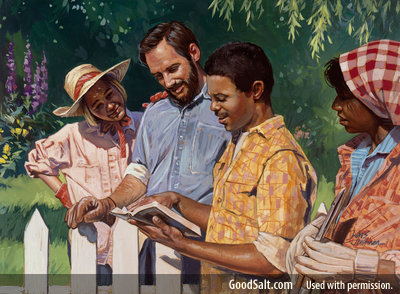“Every branch in Me that does not bear fruit He takes away.” John 15:2a
We are learning the secrets of becoming fruitful for our Lord. The first way is to realize that Jesus is our only source of life (John 15:1). The second way for us to become more fruitful for the Lord is to RECEIVE JESUS’ ENCOURAGEMENT FROM HIS WORD (John 15:2a). Jesus said to His eleven believing disciples, “Every branch in Me that does not bear fruit He takes away.” (John 15:2a). The phrase “every branch in Me”refers to Christians connected to Christ in fellowship. “Every branch” refers to Christians because they are in Jesus (“in Me”). “The Vine (the Son) feeds the branches, and the Gardener (the Father) tends the branches. God’s goal for every Christian is to increase in fruit bearing. We are to pro-gress from producing no fruit (15:2) to some fruit (15:2) to more fruit (15:2) to much fruit (15:5) to remaining fruit (15:16). Fruitfulness is a life of spiritual usefulness and productivity for the good of others and the glory of God. It’s the proof of true discipleship (15:8). 1
Dillow writes, “The phrase ‘in Me’ is used 16 times in John’s Gospel (6:56; 10:38; 14:10 [twice], 11, 20, 30; 15:2, 4 [twice], 5-7; 16:33; 17:21, 23). In each case it refers to fellowship with Christ. It is inconsistent then to say the phrase in 15:2 refers to a person who merely professes to be saved but is not. A person ‘in Me’ is always a true Christian.” 2
This interpretation also finds support in the analogy of the vine and branches. “Branch(es)” (klēma, lit. tendrils) of a vine share the life of the vine. “Jesus taught that some believers in Him do not bear fruit (cf. Luke 8:14). Fruit-bearing is the normal but not the inevitable consequence of having divine life. This is true of grapevines too. Grapevines have branches that bear fruit, but they must also have some branches that presently bear no fruit, but are growing stronger so they will bear fruit in the future. There can be genuine life without fruit in a vine, and there can be in a Christian as well.
“No plant produces fruit instantaneously; it takes time for a plant to grow strong enough to bear fruit. The New Testament teaches that God effects many changes in the life of every person who trusts in Jesus for salvation. Lewis Sperry Chafer noted 33 things that happen to a person the moment he or she trusts Jesus Christ as Savior. However, these are all invisible changes.” 3
How does God respond to believers who do not bear fruit? Jesus says that He “takes away” that branch. The word for “takes away” (airō) can also mean “to lift up.” 4 This was the common practice among ancient vineyard growers during this time of the year. 5 Vineyard growers would lift up fruitless vines which were on the ground in order for them to become fruit-bearing again. Lifting the branch off the ground prevents unhealthful secondary roots from growing into the ground and also allows air to dry the branch and keep it from becoming moldy and diseased.
This understanding of airō fits the context very well. Jesus is speaking to His believing disciples and they may have been like branches on the ground (discouraged) when Jesus told them He would be leaving them, and that Peter would deny Him (John 13:33, 38). God the Father, the Vinedresser, “takes them away” from the ground by lifting them up or encouraging them through Jesus’ promises about heaven (John 14:1-6) and the coming of the Holy Spirit (John 14:16-18, 25-27) so they can become fruitful for Him.
When we become discouraged, and all of us do, we need to receive Christ’s Word so God can lift us up through the promises of His Word or through another believer who shares those promises with us.
Do you feel that God is against you during the COVID pandemic? Refocus on Romans 8:31-32 [GNT]: “In view of all this, what can we say? If God is for us, who can be against us? Certainly not God, Who did not even keep back His own Son, but offered Him for us all! He gave us His Son—will He not also freely give us all things?”
Do you feel separated from God’s love during this difficult season? Embrace God’s promise in Romans 8:38-39: “For I am persuaded that neither death nor life, nor angels nor principalities nor powers, nor things present nor things to come, nor height nor depth, nor any other created thing, shall be able to separate us from the love of God which is in Christ Jesus our Lord.”
Do you feel “less than” or lacking? Meditate on Colossians 2:10: “And you are complete in Him, who is the head of all principality and power.”
Do you feel all alone? Listen to Isaiah 41:10: “Fear not, for I am with you; be not dismayed, for I am your God. I will strengthen you, Yes, I will help you, I will uphold you with My righteous right hand.”
Do you feel abandoned or rejected? Receive this encouragement from Hebrews 13:5: “Let your conduct be without covetousness; be content with such things as you have. For He Himself has said, ‘I will never leave you nor forsake you.’ ”
Are you feeling defeated by shame? Listen to Romans 10:11 [NLV]: “The Holy Writings say, ‘No one who puts his trust in Christ will ever be put to shame.’ ”
Do you feel overwhelmed with anxiety? Open your heart to I Peter 5:6-7 [GNT]: “Humble yourselves, then, under God’s mighty hand, so that He will lift you up in His own good time. Leave all your worries with Him, because He cares for you.”
The more we receive Jesus’ encouragement, the more loving we can become toward others (and ourselves), and then reach the lost with the life-giving gospel of Christ!
Prayer: Lord Jesus, during these difficult times I can become like a fruitless grapevine on the ground that needs to be lifted up or encouraged by Your promises. Please use Your Word to breathe new life into my soul today. I need You, my Lord and my God, to help me see myself and my circumstances from Your perspective so I may love others, including myself, with Your love. Then I will be more motivated to share Your gospel message with those who are perishing without You in their lives. Thank You in advance for hearing my prayers. In Your life-giving name I pray. Amen.
ENDNOTES:
1. Tony Evans, CSB Bibles by Holman. The Tony Evans Bible Commentary (B&H Publishing Group, Kindle Edition, 2019), pg. 1805.
2. Joseph C. Dillow, “Abiding Is Remaining in Fellowship: Another Look at John 15:1-6,” Bibliotheca Sacra 147:585 (January-March 1990), pp. 44-53.
3. Tom Constable, Notes on John, 2017 Edition, pp. 281-282; cf. L. S. Chafer, Systematic Theology, Vol III (Dallas: Dallas Seminary Press, 1947- 48), pp. 234-65.
4. A Greek-English Lexicon of the New Testament and Other Early Christian Literature, compiled by Walter Bauer, trans. and adapted by William F. Arndt and F. Wilbur Gingrich, 2nd ed., rev. and augmented by F. Wilbur Gingrich and Frederick W. Danker (Chicago: University of Chicago Press, 1979), pg. 24; The Nelson Study Bible, edited by Earl D. Radmacher (Nashville: Thomas Nelson Publishers, 1997), pg. 1794; J. Dwight Pentecost, The Words & Works of Jesus Christ (Grand Rapids: Zondervan, 1981), pg. 441.
5. Tom Constable, Notes on John, 2017 Edition, pg. 282; see Gary W. Derickson, “Viticulture and John 15:1-6,” Bibliotheca Sacra 153:609 (January-March 1996):34-52; and John A Tucker, “The Inevitability of Fruitbearing: An Exegesis of John 15:6 — Part II,” Journal of Dispensational Theology 15:45 (August 2011), pg. 52.



